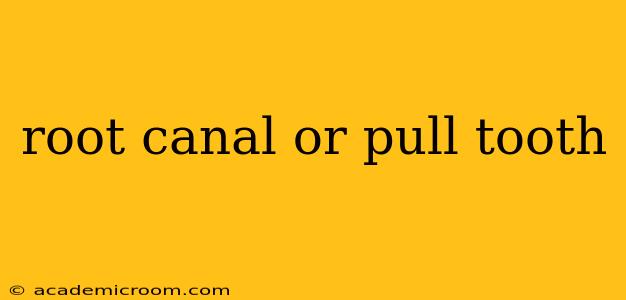Deciding between a root canal and tooth extraction is a significant decision, impacting your oral health and overall well-being. Both procedures address severely damaged or infected teeth, but the best choice depends heavily on your individual circumstances. This comprehensive guide will help you understand the differences, benefits, and drawbacks of each, empowering you to make an informed choice alongside your dentist.
What is a Root Canal?
A root canal is a procedure designed to save a severely damaged or infected tooth. Instead of removing the tooth, the dentist removes the infected pulp (the soft tissue inside the tooth containing nerves and blood vessels). The pulp chamber and root canals are then thoroughly cleaned, disinfected, and filled with a biocompatible material. Finally, a crown is typically placed to protect and restore the tooth's structure and function.
Benefits of a Root Canal:
- Saves your natural tooth: This preserves your natural bite and jawbone structure, preventing the need for more extensive and costly restorative procedures later.
- Maintains your smile's aesthetics: A successfully treated tooth looks and functions like a natural tooth.
- Long-lasting solution: With proper care, a root canal can last for many years.
Drawbacks of a Root Canal:
- More complex procedure: Root canals are more involved than extractions and typically require multiple appointments.
- Potential for complications: Although rare, complications such as reinfection or persistent pain are possible.
- Higher initial cost: Root canals generally cost more than extractions.
What is a Tooth Extraction?
A tooth extraction involves the surgical removal of a tooth from its socket in the jawbone. This procedure is usually recommended when a tooth is beyond repair, severely damaged, or infected and cannot be saved by other means, such as a root canal.
Benefits of a Tooth Extraction:
- Eliminates pain and infection: Extraction immediately removes the source of pain and infection.
- Simpler procedure: Extractions are generally less complex and time-consuming than root canals.
- Lower initial cost: Extractions typically cost less than root canals.
Drawbacks of a Tooth Extraction:
- Loss of a natural tooth: This can lead to shifting of adjacent teeth, affecting your bite and potentially causing jawbone deterioration over time.
- Need for replacement: To maintain proper oral function and aesthetics, an extracted tooth often requires replacement with a bridge, implant, or denture.
- Potential for complications: While generally straightforward, extraction can lead to complications like dry socket or infection.
Root Canal or Pull Tooth: Which is better for a cracked tooth?
Whether a root canal or extraction is best for a cracked tooth depends on the severity and location of the crack. A minor crack might be repairable with a filling or crown. However, a deep crack reaching the pulp may necessitate a root canal. If the crack is extensive or involves the root, extraction may be the only option.
Root Canal or Pull Tooth: Which is better for an abscessed tooth?
An abscessed tooth, characterized by a painful infection at the root, often requires a root canal if the tooth's structure allows for it. However, if the infection is severe or the tooth is severely damaged, extraction might be the more appropriate choice. Your dentist will assess the situation to determine the best treatment.
What are the long-term effects of a root canal vs. tooth extraction?
Long-term, a successful root canal preserves your natural tooth, maintaining your bite, jawbone structure, and smile's aesthetics. An extraction, while resolving the immediate problem, may necessitate a replacement to prevent long-term consequences such as bite problems, bone loss, and shifting teeth. Regular dental checkups are crucial after either procedure to monitor its success.
How much does a root canal cost vs. a tooth extraction?
The cost varies significantly depending on location, the complexity of the procedure, and your dental insurance coverage. Generally, root canals are more expensive than extractions. It's advisable to contact your dentist or insurance provider for a more accurate estimate.
Conclusion
The decision between a root canal and tooth extraction is a personalized one. Your dentist will carefully evaluate your specific situation, considering factors such as the extent of damage, the tooth's location, your overall oral health, and personal preferences. A thorough examination and consultation are essential to determining the best course of action for preserving your oral health and maintaining a beautiful, functional smile. Remember to discuss all your concerns and options with your dentist to make the most informed decision for your individual needs.
